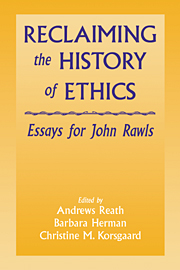Book contents
- Frontmatter
- Contents
- List of Contributors
- Introduction
- Aristotle on the Soul's Conflicts: Toward an Understanding of Virtue Ethics
- Coercion, Ideology, and Education in Hobbes's Leviathan
- The Hobbesian Side of Hume
- The Natural Goodness of Humanity
- Metaphysics, Philosophy: Rousseau on the Problem of Evil
- Within the Limits of Reason
- A Cosmopolitan Kingdom of Ends
- Legislating for a Realm of Ends: The Social Dimension of Autonomy
- Kant on the Objectivity of the Moral Law
- Kantian Virtue: Priggish or Passional?
- Taking the Law into Our Own Hands: Kant on the Right to Revolution
- Kant on Aesthetic and Biological Purposiveness
- Kant on Ends and the Meaning of Life
- Community and Completion
The Hobbesian Side of Hume
Published online by Cambridge University Press: 04 November 2009
- Frontmatter
- Contents
- List of Contributors
- Introduction
- Aristotle on the Soul's Conflicts: Toward an Understanding of Virtue Ethics
- Coercion, Ideology, and Education in Hobbes's Leviathan
- The Hobbesian Side of Hume
- The Natural Goodness of Humanity
- Metaphysics, Philosophy: Rousseau on the Problem of Evil
- Within the Limits of Reason
- A Cosmopolitan Kingdom of Ends
- Legislating for a Realm of Ends: The Social Dimension of Autonomy
- Kant on the Objectivity of the Moral Law
- Kantian Virtue: Priggish or Passional?
- Taking the Law into Our Own Hands: Kant on the Right to Revolution
- Kant on Aesthetic and Biological Purposiveness
- Kant on Ends and the Meaning of Life
- Community and Completion
Summary
For years after the publication of Leviathan in 1651, there was enormous interest in Thomas Hobbes's project of defining and justifying the virtues as dispositions that (in the right circumstances) advance self-interest. One theorist who was strongly influenced by this approach a century later was David Hume (a philosopher who tends to be incorrectly classed with the Benthamite utilitarians who followed him), insofar as he relies on self-interest to defend what he calls the “artificial” virtues (such as being just, respecting others' property rights, keeping one's promises, and being chaste). But Hume's moral theory also has a non-Hobbesian side, which credits people with substantial other-regarding sentiments that are the source of what he calls the “natural” virtues (such as being benevolent or generous or humble). These two sides of Hume's moral theory reflect his desire to join together the Hobbesian moral approach and the sentiment-based approaches of Scottish moralists, such as Hutcheson and Shaftesbury.
In this essay I have two objectives: First, I want to show just how considerable Hume's “Hobbesian side” is. I argue not only that Hume's theory of the artificial virtues is developed along Hobbesian lines, but also that his theory of the natural virtues uses Hobbesian ideas to explain the process by which these virtues are generated. Second, I want to show that Hume's attempt to join a morality of sentiment to a Hobbesian morality is full of problems so severe that philosophers who wish to develop a sentiment-based moral theory should be wary of using Humean models to do so.In the end, Hume's Hobbesian side turns out to be virtually all of the Humean theory, leaving sentiment with virtually nothing to do.
- Type
- Chapter
- Information
- Reclaiming the History of EthicsEssays for John Rawls, pp. 66 - 101Publisher: Cambridge University PressPrint publication year: 1997
- 2
- Cited by



